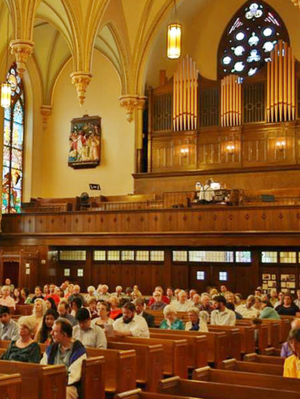
 HE WORKSHOP is finally here. The Summer Sacred Music Workshop 2016 will be held at the Basilica of Saints Peter and Paul in Chattanooga this weekend, from Friday afternoon to Saturday evening. Information including the full schedule of this year’s workshop can be found on the official website of Southeastern Sacred Music. I am sad to inform everyone that I won’t be able to attend this workshop. I will stay in touch with the faculty members and post a report about the event later. I am also hoping to release here, on Views from the Choir Loft, the two plenary talks: “The Spiritual Fruits of Gregorian Chant” by Dr. Jennifer Donelson and “The Revolution of Obedience” by Fr. David Carter.
HE WORKSHOP is finally here. The Summer Sacred Music Workshop 2016 will be held at the Basilica of Saints Peter and Paul in Chattanooga this weekend, from Friday afternoon to Saturday evening. Information including the full schedule of this year’s workshop can be found on the official website of Southeastern Sacred Music. I am sad to inform everyone that I won’t be able to attend this workshop. I will stay in touch with the faculty members and post a report about the event later. I am also hoping to release here, on Views from the Choir Loft, the two plenary talks: “The Spiritual Fruits of Gregorian Chant” by Dr. Jennifer Donelson and “The Revolution of Obedience” by Fr. David Carter.
Everyone is invited to join the Solemn Vespers at the basilica at 7pm on Friday. Fr. Samuel Weber, OSB, has been commissioned to develop the program for this Sung Vespers. It will be premiered on the very first Feast of St. Mary Magdalene.
Following Vespers, there will be an organ recital featuring four talented organist: Joseph D’Amico, Bruce Ludwick Jr., Ericka McCarty and Andrea Tierney. This organ recital will showcase the basilica’s historic pipe organ as the King of Instruments of sacred music. A range of musical styles and levels of difficulty will be presented, as an inspiration for all parishes and aspiring organists. There is also an “Open Mic” opportunity for organists attending the workshop.
The Closing Mass at 4pm on Saturday is also open to the public. The Sung Mass will be offered in the Ordinary Form of the Roman Rite by Fr. David Carter, the rector of the basilica. The music, including the Propers, Gregorian Ordinaries and two motets, will be provided by the participants.
Don’t miss these events and the basilica’s holy door if you are in the area! Please keep all the attendees in your prayers, for safe travels and fruitful experience.
